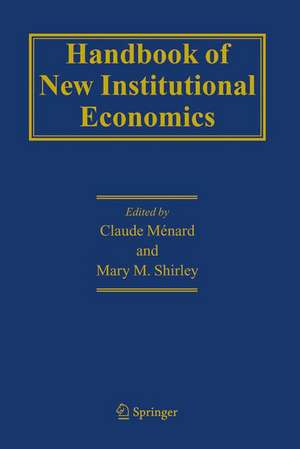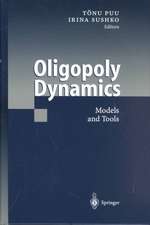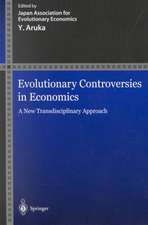Handbook of New Institutional Economics
Editat de Claude Ménard, Mary M. Shirleyen Limba Engleză Hardback – iul 2005
| Toate formatele și edițiile | Preț | Express |
|---|---|---|
| Paperback (1) | 759.24 lei 6-8 săpt. | |
| Springer Berlin, Heidelberg – 15 apr 2008 | 759.24 lei 6-8 săpt. | |
| Hardback (1) | 2182.81 lei 6-8 săpt. | |
| Springer Us – iul 2005 | 2182.81 lei 6-8 săpt. |
Preț: 2182.81 lei
Preț vechi: 2661.97 lei
-18% Nou
Puncte Express: 3274
Preț estimativ în valută:
417.74€ • 431.54$ • 347.66£
417.74€ • 431.54$ • 347.66£
Carte tipărită la comandă
Livrare economică 25 martie-08 aprilie
Preluare comenzi: 021 569.72.76
Specificații
ISBN-13: 9781402026874
ISBN-10: 1402026870
Pagini: 884
Ilustrații: XIV, 884 p.
Dimensiuni: 155 x 235 x 56 mm
Greutate: 3.14 kg
Ediția:2005
Editura: Springer Us
Colecția Springer
Locul publicării:New York, NY, United States
ISBN-10: 1402026870
Pagini: 884
Ilustrații: XIV, 884 p.
Dimensiuni: 155 x 235 x 56 mm
Greutate: 3.14 kg
Ediția:2005
Editura: Springer Us
Colecția Springer
Locul publicării:New York, NY, United States
Public țintă
ResearchCuprins
The Domain of New Institutional Economics.- Institutions and the Performance of Economies Over Time.- The Institutional Structure of Production.- Transaction Cost Economics.- Political Institutions and the State.- Electoral Institutions and Political Competition.- Presidential versus Parliamentary Government.- Legislative Process and the Mirroring Principle.- The Performance and Stability of Federalism: An Institutional Perspective.- Legal Institutions of a Market Economy.- The Many Legal Institutions that Support Contractual Commitments.- Legal Systems as Frameworks for Market Exchanges.- Market Institutions and Judicial Rulemaking.- Legal Institutions and Financial Development.- Modes of Governance.- A New Institutional Approach to Organization.- Vertical Integration.- Solutions to Principal-Agent Problems in Firms.- The Institutions of Corporate Governance.- Firms and the Creation of New Markets.- Contractual Arrangements.- The Make-or-Buy Decision: Lessons from Empirical Studies.-Agricultural Contracts.- The Enforcement of Contracts and Private Ordering.- Regulation.- The Institutions of Regulation: An Application to Public Utilities.- State Regulation of Open-Access, Common-Pool Resources.- Property Rights and the State.- Licit and Illicit Responses to Regulation.- Institutional Change.- Institutions and Development.- Institutional and Non-Institutional Explanations of Economic Differences.- Institutions and Firms in Transition Economies.- Social Capital, Social Norms and the New Institutional Economics.- Commitment, Coercion, and Markets: The Nature and Dynamics of Institutions Supporting Exchange.- Perspectives.- Economic Sociology and New Institutional Economics.- Doing Institutional Analysis Digging Deeper Than Markets and Hierarchies.
Recenzii
From the reviews:
The Handbook of New Institutional Economics edited by Claude Menard and Mary Shirley gives an excellent picture of this emerging field. It also addresses the most interesting questions now at the forefront of economic research. - George Akerlof, University of California at Berkeley; Nobel Laureate
Over the last thirty years, a very important influence on the development of economic analysis has been the emphasis on rights to property, their transferability and their implications for economic behavior, especially in relation to the law. It is very valuable to have the material of the "new institutional economics" brought together in a handbook, and especially so when the authors are themselves the leading researchers in the field. I look forward to using the handbook and to seeing its influence on further research. - Kenneth J. Arrow, Stanford University; Nobel Laureate
I would like to recommend this book to economists of both East and West who have been focusing on comparing economic systems for the last decades, who have been examining first the reforms implemented in the communist countries and then the post-socialist transition there, and who have always been aware of the particular importance of institutions. Having read the outstanding and comprehensive essays published in this new Handbook, one can clearly see the close intellectual kinship between the approach used by the scholars studying post-socialist transformation and by the research program of "New Institutional Economics. - Janos Kornai, Collegium Budapest
New institutional economics has been at the forefront of our search for understanding how societies operate and economies change. Until this handbook there has been no single volume explaining the field and exploring its horizons. It contains fascinating essays by the leading scholars in the field that provide an excellent overview of the any facets of NIE. NIE is here to stay and this book provides a comprehensive introduction for those interested in learning more about it. - Vernon Smith, George Mason University; Nobel Laureate
"New Institutional Economics (NIE) has skyrocketed over the last three decades. … This first handbook of NIE provides an overview of recent developments and broad orientations. … This handbook will be of interest to economists, political scientists, legal scholars, management specialists, sociologists, and others wishing to learn more and gain insight into progress made by institutionalists from other disciplines. This compendium of analyses by some of the foremost NIE specialists … raises questions … and supplies scholars with tools for exploring answers to these questions." (Beyond Transition Newsletter, The World Bank, Vol. 16 (3), 2005)
The Handbook of New Institutional Economics edited by Claude Menard and Mary Shirley gives an excellent picture of this emerging field. It also addresses the most interesting questions now at the forefront of economic research. - George Akerlof, University of California at Berkeley; Nobel Laureate
Over the last thirty years, a very important influence on the development of economic analysis has been the emphasis on rights to property, their transferability and their implications for economic behavior, especially in relation to the law. It is very valuable to have the material of the "new institutional economics" brought together in a handbook, and especially so when the authors are themselves the leading researchers in the field. I look forward to using the handbook and to seeing its influence on further research. - Kenneth J. Arrow, Stanford University; Nobel Laureate
I would like to recommend this book to economists of both East and West who have been focusing on comparing economic systems for the last decades, who have been examining first the reforms implemented in the communist countries and then the post-socialist transition there, and who have always been aware of the particular importance of institutions. Having read the outstanding and comprehensive essays published in this new Handbook, one can clearly see the close intellectual kinship between the approach used by the scholars studying post-socialist transformation and by the research program of "New Institutional Economics. - Janos Kornai, Collegium Budapest
New institutional economics has been at the forefront of our search for understanding how societies operate and economies change. Until this handbook there has been no single volume explaining the field and exploring its horizons. It contains fascinating essays by the leading scholars in the field that provide an excellent overview of the any facets of NIE. NIE is here to stay and this book provides a comprehensive introduction for those interested in learning more about it. - Vernon Smith, George Mason University; Nobel Laureate
"New Institutional Economics (NIE) has skyrocketed over the last three decades. … This first handbook of NIE provides an overview of recent developments and broad orientations. … This handbook will be of interest to economists, political scientists, legal scholars, management specialists, sociologists, and others wishing to learn more and gain insight into progress made by institutionalists from other disciplines. This compendium of analyses by some of the foremost NIE specialists … raises questions … and supplies scholars with tools for exploring answers to these questions." (Beyond Transition Newsletter, The World Bank, Vol. 16 (3), 2005)
Caracteristici
Includes supplementary material: sn.pub/extras


